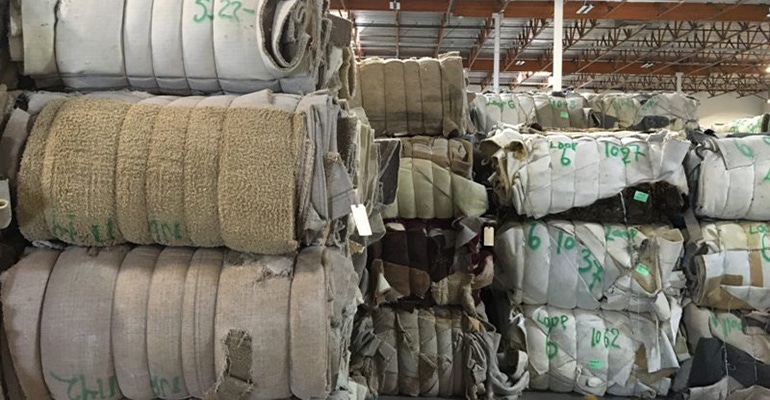Planet Recycling diverts more than 10,000 tons of post-consumer carpets annually. Starting in mid-December, it will deliver used carpet material to the Aquafil carpet recycling facility in Phoenix.
December 1, 2020

Aquafil Group, based in Cartersville, GA, has announced that the Planet Recycling Inc. carpet collections network will join its journey to the circular economy in mid-December 2020. Phoenix-based Planet Recycling has been recycling residential and commercial carpet waste and carpet pad materials for more than 35 years.
Planet Recycling diverts more than 10,000 tons of post-consumer carpets and carpet pads from Phoenix Valley and San Diego County landfills each year. The company’s existing collection facilities will enhance the availability of used carpet material for the Aquafil carpet recycling facility in Phoenix. It will also create a stable quantity of nylon waste for a regeneration plant in Solvenia, where carpet waste and other materials, such as fishing nets, are regenerated to make Econyl yarns and polymers.
Each year in the United States, four billion pounds of carpet are discarded in landfills and only five percent of carpet waste is recycled. Aquafil Group is committed to help reduce this waste by implementing a closed-loop supply chain where carpets are recycled. “If all carpets were made of nylon-6, we could recycle them all efficiently and with minimal cost in order to create a fully circular supply chain for carpet materials,” said Giulio Bonazzi, Aquafil Group President and CEO. “The integration of the Planet Recycling business is a big component of the company’s long-term strategy and will ultimately increase the use of recycled carpet material for Aquafil customers across the globe.”
Aquafil has two carpet recycling facilities — in Phoenix and Woodland, CA — that can each process up to 36 million pounds of carpet annually. That is equal to the total weight of 27 Airbus A380 planes.
“The combination of Aquafil and Planet Recycling’s expertise enables us to create a unique carpet recycling loop across the entire supply chain from collection to recycling and fiber manufacturing,” said Franco Rossi, President of Aquafil USA.
“We are thrilled to continue our journey to build a circular supply chain with a company that has also invested in solutions to help preserve our planet for the last several decades,” said Rachel Palopoli, part of the family that founded and operates Planet Recycling. Palopoli will direct the new Aquafil Carpet Recycling collection point to increase used carpet collection both in Arizona and California.
Demo-scale facility will produce largest quantity ever of 100% renewable nylon-6.
Following on the heels of the Aquafil/Planet Recycling announcement, clean manufacturing leader Genomatica in San Diego, CA, signed a first-of-its kind deal with Aquafil to build a demonstration-scale facility to produce the largest quantity ever of 100% renewable nylon-6. Responding to surging consumer interest in sustainable products, the material will go to leading global brands eager to explore and develop renewable products, create showcase goods, and test feedback with customers.
The deal is a 50-fold expansion over previous production levels and represents significant acceleration toward commercializing renewably sourced nylon-6, a material that is poised to reshape the $960-billion textile industry that touches millions of lives every day, from the carpet we walk on to the clothes we wear, said Genomatica.
The multi-year agreement provides the foundation for a more sustainable nylon value chain by expanding a longstanding Genomatica partnership with Aquafil. The two companies teamed up in January 2020 to produce the world’s first ton of bio-nylon-6 precursor at pilot scale. Relying on their expertise in scaling up renewably sourced chemicals, Genomatica and Aquafil are moving directly to a larger-than-typical demonstration scale to support initial commercial applications by committed brand partners. The first production runs are slated to create 50 tons of bio-nylon for pre-commercial use by Genomatica’s brand partners. The demonstration plant will continue to support product needs until commercial scale plants are in operation.
“Bio-nylon is positioned to replace a material that’s used in millions of applications every day,” said Christophe Schilling, Genomatica CEO. “Our research shows that despite health and economic turmoil, 56% of Americans still want brands to prioritize sustainability. At this scale, Genomatica is offering our brand partners a key way to meet their sustainability objectives, differentiate themselves, and meet surging consumer demand.”
Genomatica harnesses synthetic biology to develop more-sustainable, high-performance key ingredients for everyday products, using plants and waste rather than fossil fuels or other non-sustainable sources like palm oil.
Genomatica and Aquafil will work together to implement and refine their respective technology contributions through this demonstration program and create large quantities of bio-nylon. Acquafil will build and operate the downstream operations of the large-scale demonstration plant at its facility in Slovenia, where it will convert Genomatica’s bio-based precursor to commercial-quality bio-nylon-6 yarns, films, and engineered plastics. The material will be used to develop renewably sourced products, replacing traditional nylon that generates upwards of 60 million tons of greenhouse gas emissions annually, explained Genomatica. Under this arrangement, initial volumes of bio-nylon ingredients will be available by the latter half of 2021.
About the Author(s)
You May Also Like




